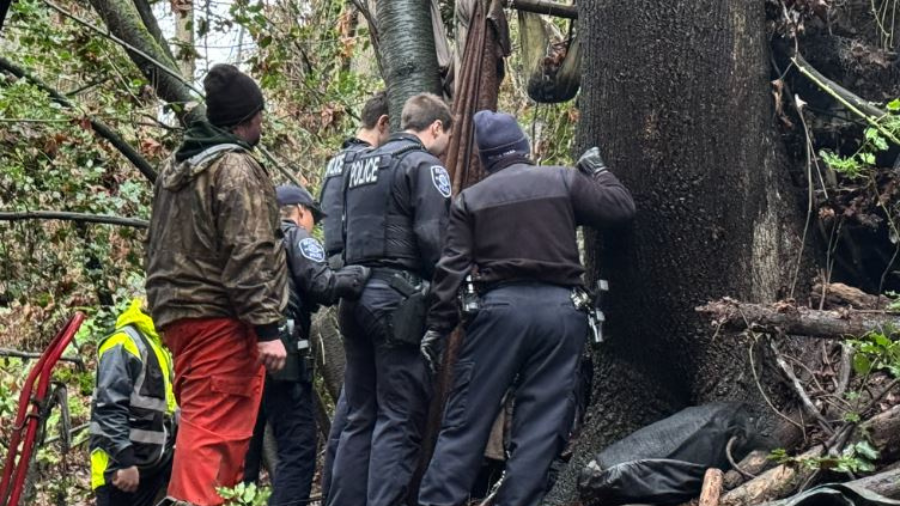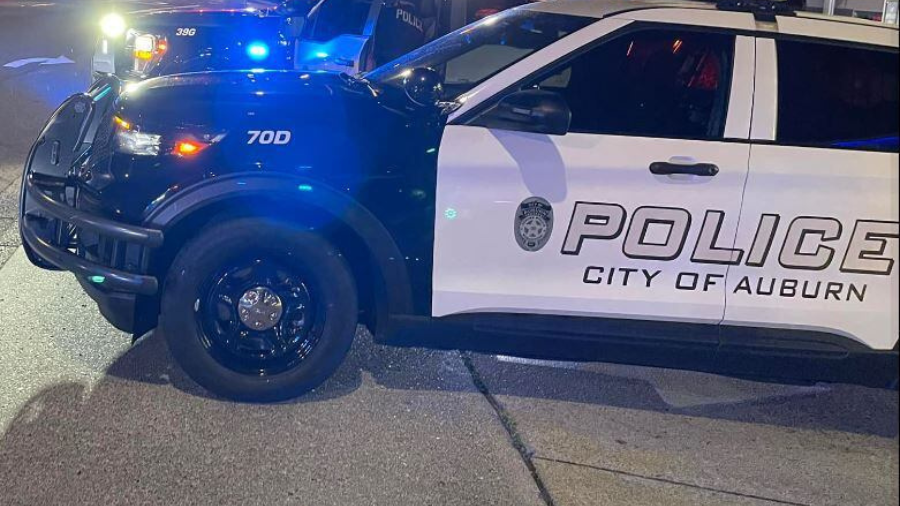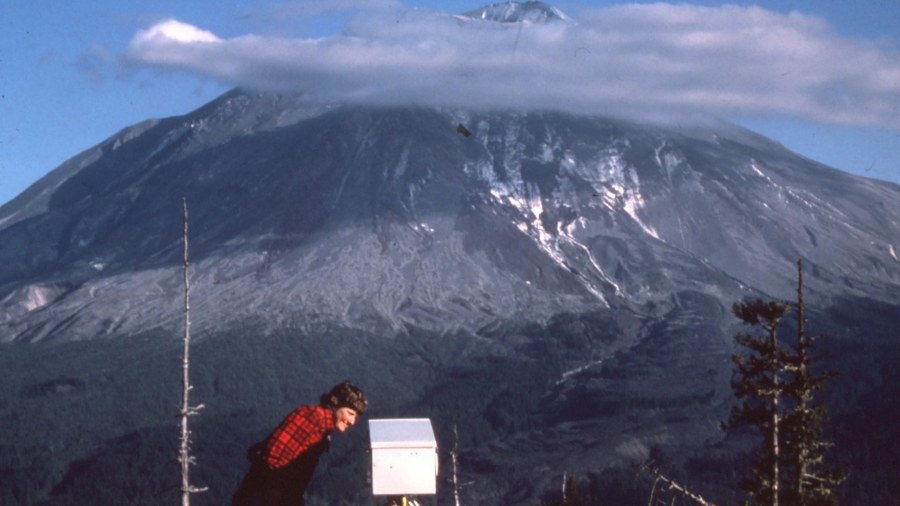In Plain Sight: Critics claim We Heart Seattle destroys homeless peoples’ property
Apr 2, 2024, 7:10 AM | Updated: Apr 3, 2024, 9:17 am
This is a KIRO Newsradio exclusive video series, In Plain Sight, from reporter Sam Campbell about the nonprofit organization We Heart Seattle. Above is the second installment, Civic Duty or Civic Disruption? Keep reading for the story.
In Plain Sight Part 1: How controversial nonprofit We Heart Seattle uncovered human remains
In Plain Sight Part 3: Questions surround We Heart Seattle, King County policies
In Part 1 of this series, KIRO Newsradio heard from Andrea Suarez and We Heart Seattle. Now, we examine criticisms leveled against the nonprofit, and we talk with some who say We Heart Seattle has gone too far.
During its three-year run, We Heart Seattle’s “boots-on-the-ground” approach has gained the nonprofit much attention — but much of it is highly critical. Search engine results of the nonprofit’s name led to countless accusations across multiple social media platforms.
The posts accuse We Heart Seattle (WHS) of lying to people living in the camps about who they are, destroying the belongings of homeless people without asking permission, and more allegedly unethical behavior.
Part One of In Plain Sight: How controversial nonprofit We Heart Seattle uncovered human remains
The scathing entries come from critics as well as those purporting to be close to homeless people WHS has interacted with.
An entire website is dedicated to documenting alleged misdeeds of WHS called “We Heart Seattle Exposed.”
William Hughes, known independently from the websites and social media, spoke to KIRO Newsradio about his encounters with WHS. Hughes previously lived under the Ship Canal Bridge for two years. He said he has run into Suarez and We Heart Seattle volunteers at multiple camps.
“She walks by this one tent and she goes, ‘Wow, that tent is — ‘ and (she) just steps on it, and says, ‘Yeah, that’s trash,” Hughes said, recalling one purported incident with Suarez and her volunteers at a camp. “It was our friend’s tent. He wasn’t there for a couple of days because he had to go do some things. But he lived there, and his stuff was in there. And she said, ‘Looks like trash to me.'”
Comparing WHS to JustCare, an outreach and shelter program supported by King County, Hughes said the difference is JustCare has a level of accountability intrinsic to their cooperation with local government.
‘No one is a trained social worker:’ WHS’ lack of formal training raises concerns
It’s the same lack of affiliation and cooperation that worries some advocates and activists.
“When REACH and LEAD will go out and do — when they’ll go out and do outreach, these are trained social workers that are also, you know, they’re also coming along, so they have the training and knowledge to make that harm less impactful,” said Mutual Aid worker and activist Alycia Ramirez, an outspoken critic of the nonprofit.
REACH is an outreach team led by Evergreen Treatment Services. LEAD diverts low-level drug offenders into treatment, often away from jail time.
“I don’t think anyone on Andrea’s board, including Andrea herself, has any prior experience with that. No one is a trained social worker,” Ramirez added. “There are some things that you can do that you don’t necessarily need to go to college and get a degree for. But with casework especially, it’s not just something you can go around and say, ‘I’m a social worker’ or ‘I’m a case worker,’ and that has happened in the past.”
Fellow Mutual Aid worker and activist Aiden Carroll noted how much time outreach workers need to spend to demonstrate that their intentions are real and not malicious.
“I know outreach workers have to spend a lot of effort, in some cases demonstrating that they’re sincere,” Carroll said. “It’s a real issue. It’s creating more barriers.”
Suarez claims she chooses camps to target for cleanups and then does “welfare checks.” KIRO Newsradio asked about the visits and her credentials.
“We are caseworkers. Tim and I are caseworkers. We’ve been doing this for three and a half years,” Suarez said. “We’ve been through trauma-informed care training, de-escalation training, on-the-job training. My educators are the 200 people and the thousands of homeless that we’ve met right here on the slopes that have said, ‘You guys are game changers.'”
More on We Heart Seattle: Volunteer group says it has cleared 1 million pounds of trash in Seattle camps
When asked by KIRO Newsradio if she had any official licensing from the state or anywhere else, her response shifted the conversation in a different direction.
“I don’t know, did Jesus Christ have a license?” Suarez said.
Hughes, a Christian, disputed Suarez’s characterization, saying “Jesus wouldn’t do the things I’ve seen her do.”
YouthCare Center confronts Suarez after case manager claim
The topic of whether Suarez maintained proper credentials to identify herself as a case worker came up in March 2021 at the YouthCare Orion Center in Seattle, which provides services to homeless young people.
YouthCare Director of Marketing Pascha Scott spoke with KIRO Newsradio about the incident.
“A woman came to the rain center one evening, knocked on the door. And the staff on site that evening, let her in. And she said she was a young person’s case manager identifying that young person by name. At that point, the staff asked that she identify herself and her agency. She said she was Andrea Suarez with We Heart Seattle … She was not known to the staff as a caseworker (or) as a case manager,” Scott said, recounting an incident report filed by staff at the time.
Scott stated case management is an internal service provided at Orion Center. When Suarez allegedly asked about one of their young clients by name, the staff asked to her stand outside to protect the privacy of other young clients.
According to Scott, Suarez took that to mean she was being kicked out. After the publication of In Plain Sight, Suarez said the incident happened in 2020, but did not dispute the details from Scott.
When asked about other accusations and criticisms of WHS, Suarez dismisses them either as exaggerations or lies.
“It’s manufactured controversy on some random website,” Suarez said. “Even people who are out out here living rough (say) ‘I read that and it’s like, yeah, some woman has it after you.'”
“It’s just a middle school playground set of accusations that has nothing to do with the real work we’re doing,” she added. “Anybody that comes out here and volunteers from us — if anything, thank you for the publicity haters, because, you know, no good deed goes unpunished. And if you’re not out here with us, then you have no right having any opinion there or otherwise about what we’re doing.”
Suarez continued to dispute the claims, instead highlighting charitable work she said WHS has accomplished.
“We’ve saved lives. We’ve created lives. We’ve created jobs. We’ve restored green spaces,” Suarez said. “Frankly, I think we have become unassailable, and they’ve quieted way down.”

SPD officers and We Heart Seattle staff search through an encampment where human remains were uncovered. (Photo courtesy of We Heart Seattle)
Suarez fires back at website critical of WHS
Since that interview, Suarez sent in additional comments to KIRO Newsradio responding to the allegations. She disputes the validity of the highly critical website, We Heart Seattle Exposed.
She points out its lack of bylines with each article posted. In fact, the site doesn’t list the author of every post, only occasionally mentioning the first names of people purportedly involved. Its only official attribution is at the bottom of the page — an apparent copyright for a group named Concerned Citizens Against We Heart Seattle 2023.
Domain registry searches do not show the name of the site’s registrant, listing it and any administrator as “redacted for privacy.”
The real identity of the authors of We Heart Seattle Exposed remains unknown to KIRO Newsradio at the time of this publication.
More from Sam Campbell: Burien City Council member confronts homeless outside condo
The response from Suarez continued, saying WHS is made of “everyday citizens in volunteer groups” that “are making a positive daily impact.” Suarez said they are “taking action to support the city even when sometimes there is opposition that doesn’t always see things the way we do.”
Critics maintain their distrust of We Heart Seattle, with some pointing to an official criminal case against a former board president of WHS. KIRO Newsradio examined the charges and heard from a homeless man who now volunteers with the nonprofit, saying WHS picked him up out of despair.
That story comes in the next installment of In Plain Sight.
This is the second installment in a three-part series. Check back on MyNorthwest for updated stories. All three videos are currently up on the KIRO Newsradio YouTube channel.
You can read more of Sam Campbell’s stories here. Follow Sam Campbell on X, formerly known as Twitter, or email him here.













